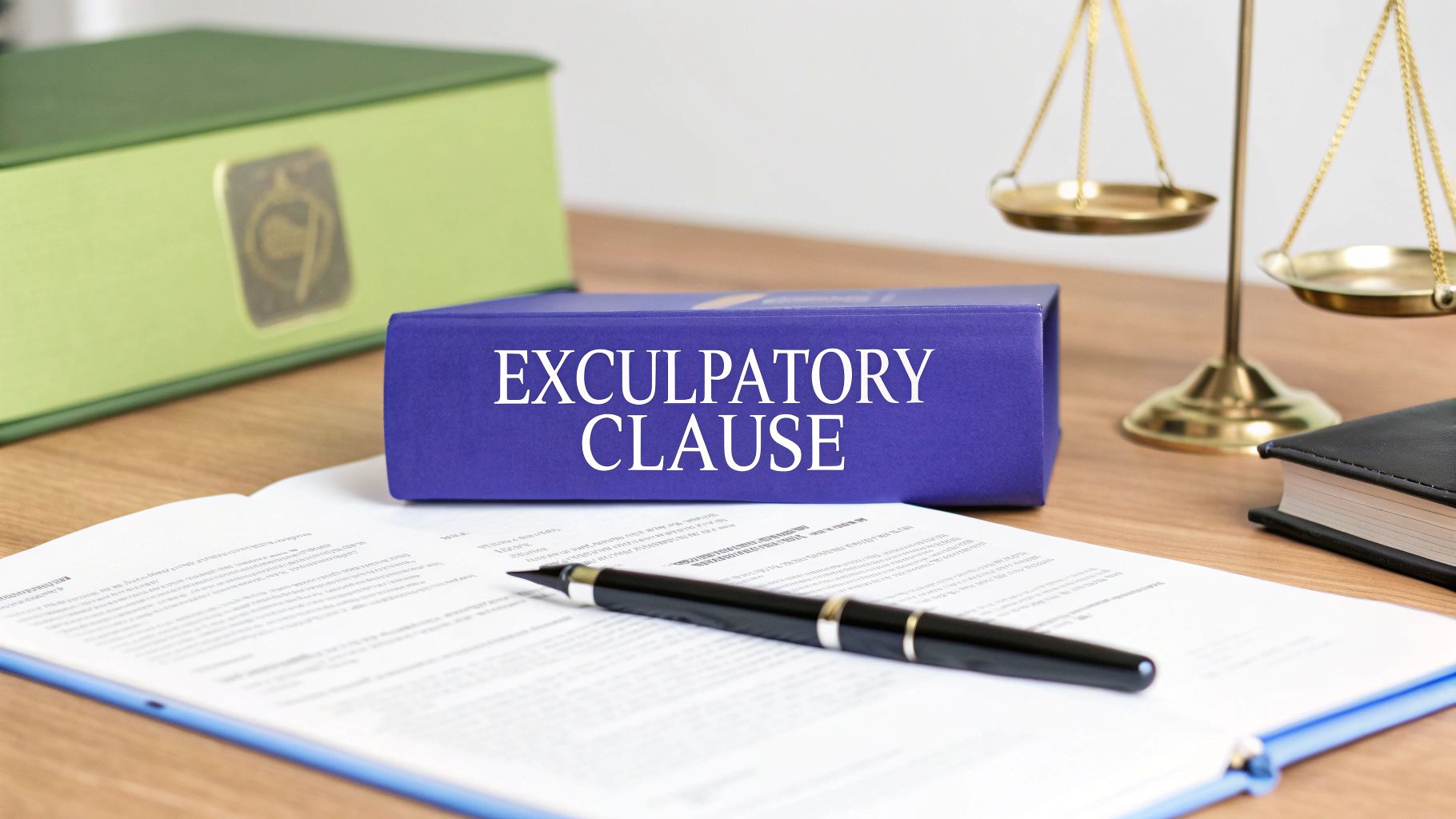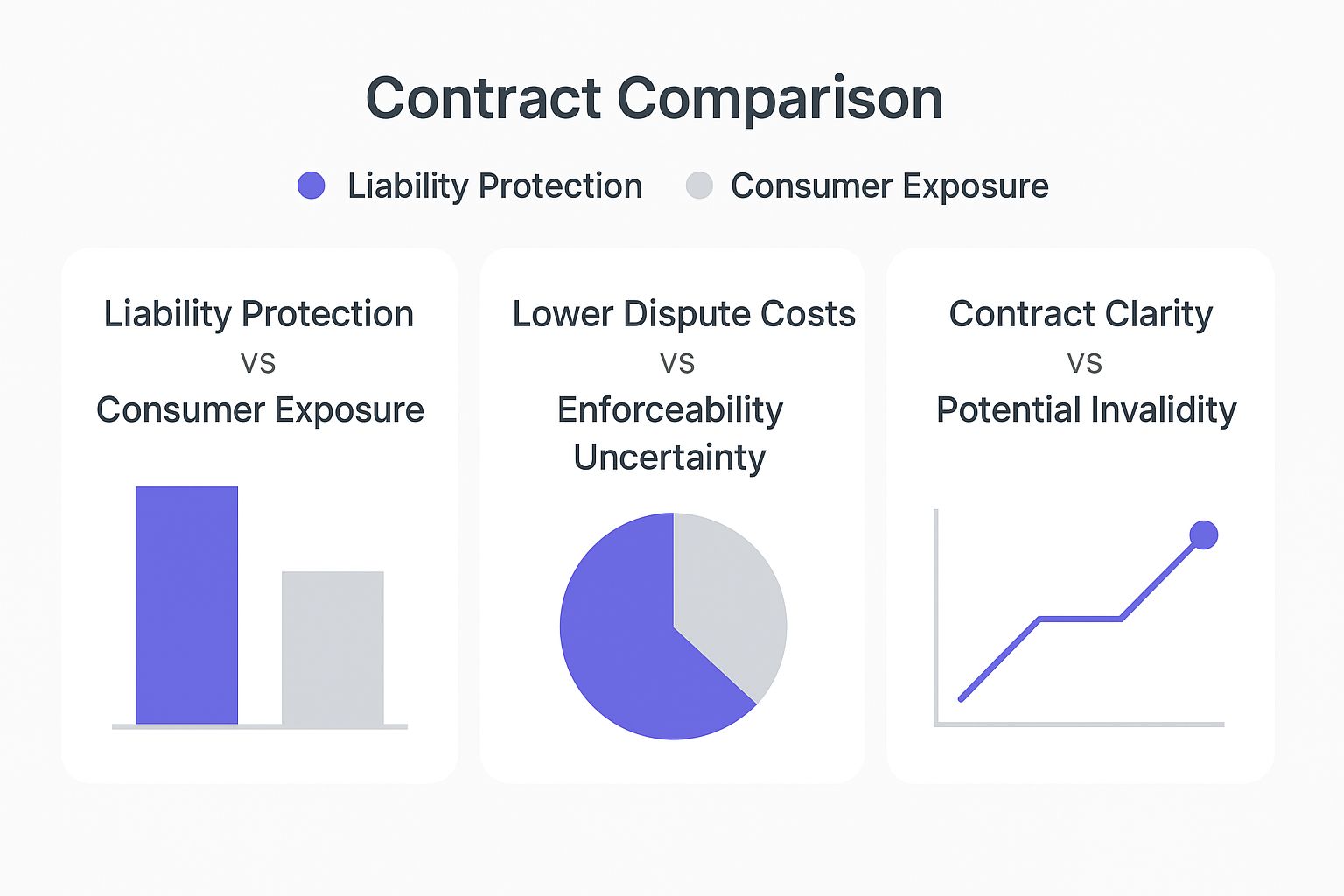
Ever signed up for a gym membership? You almost certainly signed a waiver stating you wouldn't sue them if you pulled a muscle lifting weights. That, in a nutshell, is an exculpatory clause at work.
It's a specific provision tucked into a contract that essentially lets one party off the hook for liability if something goes wrong and damages or injuries occur.
Understanding The Core Function Of An Exculpatory Clause

Think of an exculpatory clause as a "liability shield" built right into an agreement. Its main job is to shift the risk of something going wrong from one party to another. By including this clause, a business or individual is trying to protect themselves from lawsuits tied to negligence.
This isn't just legalese; it's a tool for getting ahead of potential legal fights. One party agrees to absolve the other of blame for future incidents before they even happen. In doing so, you're effectively waiving your right to sue for certain kinds of harm.
The Foundation In Contract Law
To really get a handle on these clauses, it helps to know the basic fundamentals of contract law. At their heart, contracts are about mutual agreement, and an exculpatory clause is simply one of the terms both parties are agreeing to. But its power isn't unlimited—courts look at these clauses very, very closely.
An exculpatory clause is a contractual provision that relieves one party from liability for damages or injuries that may occur during the execution of the contract, effectively shifting or limiting responsibility for harm.
You see these clauses pop up in all sorts of everyday situations. They're in the fine print when you buy electronics, limiting the seller's liability for later damages. They’re also in the permission slips parents sign for school field trips. You can dive deeper into how these clauses are used in our article explaining what is exculpation.
Exculpatory Clause Key Features at a Glance
To give you a quick cheat sheet, here’s a table that breaks down the fundamental features of an exculpatory clause.
| Feature | Description |
|---|---|
| Risk Allocation | Transfers potential liability for negligence from one party to another. |
| Contractual Provision | It is a specific term included within a larger written agreement. |
| Scope Limitation | It typically only covers ordinary negligence, not gross negligence or intentional harm. |
| Notice Requirement | For a clause to be valid, it must be clear, unambiguous, and conspicuous. |
While the exact wording changes from one contract to the next, most exculpatory clauses share these core traits. They're all designed to achieve that one primary goal: shifting risk.
Where You Encounter Exculpatory Clauses in Daily Life
Believe it or not, you’ve probably agreed to an exculpatory clause dozens of times without even realizing it. These aren't just for obscure, high-stakes legal documents. They're cleverly woven into the fabric of many everyday activities and services.
Once you know what to look for, you'll start seeing them everywhere. Think about the last time you joined a gym or signed your kids up for a trampoline park. That waiver you signed before getting started? It almost certainly had an exculpatory clause buried in the fine print. Its goal is to shield the business from lawsuits if you get hurt from ordinary negligence—like tripping over a dumbbell or spraining an ankle on a jump.
Common Places These Clauses Hide
These clauses are especially common in industries that involve some level of risk, even if it’s just perceived. The logic is simple: businesses offering recreational or hands-on services want to limit their exposure to lawsuits that could arise from the inherent risks of the activity. It's a widespread practice. In fact, it's estimated that over 90% of commercial recreational service providers in the U.S. use them. You can dive deeper into the stats with this chart on liability waivers.
Here are a few places you'll almost always find an exculpatory clause:
- Rental Agreements: When you rent a car, power tools, or even an apartment, the contract likely has a clause limiting the company's liability if the equipment malfunctions or an accident happens on the property.
- Event Tickets: Ever read the fine print on the back of a concert or sports ticket? It usually includes language releasing the venue from responsibility if you get injured during the event.
- Software and Apps: Those Terms of Service you quickly click "Agree" on are full of them. They typically protect the developer from liability for things like data loss, bugs, or service outages.
By signing a contract with an exculpatory clause, you're essentially telling the business, "I understand there are risks involved, and I agree not to hold you responsible for certain things that might go wrong." This is a big reason why courts sometimes uphold them—they view it as a voluntary agreement between two parties.
Understanding The Business Perspective
It’s easy to see these clauses as a way for companies to dodge responsibility, but it helps to understand why they exist. From a business standpoint, each clause is a strategic tool for managing risk.
A rock-climbing gym is worried about falls. A software company is concerned with data breaches. A landlord wants to avoid liability for a tenant's slip-and-fall. Each one uses an exculpatory clause tailored to their specific operational risks.
Take a parking garage, for instance. The owner includes an exculpatory clause to protect the business from claims if a car is broken into or damaged. Without it, the garage's insurance premiums could skyrocket, forcing them to raise parking fees for everyone. The clause shifts that risk to the car owner, who is expected to have their own insurance policy.
Knowing what an exculpatory clause is and why it's there makes you a much smarter consumer, fully aware of the agreements you're stepping into every day.
How These Clauses Work In Finance And Real Estate

Exculpatory clauses aren't just for signing away your rights before you go skydiving. They’re workhorses in the high-stakes worlds of finance and real estate. When you're dealing with millions of dollars, these provisions are absolutely essential for drawing clear lines around risk and protecting everyone's assets.
Take mortgage lending, for instance. An exculpatory clause is the core of what’s known as non-recourse debt. For a borrower, this can be a game-changer.
Normally, if you default on a loan, the lender can take the collateral—your house—and if the sale doesn't cover the full loan amount, they can come after your other personal assets to make up the difference.
A non-recourse loan flips that script. The exculpatory clause is the key, explicitly limiting the lender's claim to only the property itself. They can foreclose, but they can't touch your other savings, investments, or property. It’s a powerful safety net for the borrower.
Protecting Fiduciaries In Trusts And Estates
These clauses are just as critical when it comes to managing trusts and estates. A trustee is a fiduciary, which is a fancy way of saying they have a legal duty to always act in the best interest of the trust's beneficiaries. That responsibility comes with a heavy dose of personal risk; one bad investment, even with good intentions, could trigger a lawsuit.
This is where an exculpatory clause comes in. Written into a trust document, it can shield a trustee from being held liable for financial losses, as long as they acted in good faith and weren’t grossly negligent. This protection is what convinces many qualified, experienced professionals to take on the complex job of managing an estate—they know they won’t face financial ruin for decisions made with care and honesty.
In both finance and estate planning, these clauses are far more than just fine print. They are foundational pillars for structuring large-scale financial agreements and defining the limits of liability in major global markets like the US, UK, and EU.
These real-world applications show that an exculpatory clause is a structural tool, not just a legal footnote. To get a better handle on some of the specialized terms in this field, a good real estate and finance glossary can be an invaluable resource.
Just because you sign something doesn't mean a business gets total immunity. Courts look very, very closely at these exculpatory clauses—what they say, how they're used—and they absolutely can, and often do, refuse to enforce them. A signature isn't a blank check for a company to act irresponsibly.
The legal system draws a hard line here. It's one thing to accept a reasonable, known risk, but it's another thing entirely to be forced to shield a business from its own reckless or malicious behavior. Any clause trying to protect a party from their own gross negligence or intentional harm is almost certain to be thrown out by a judge.
Think about it this way: if a ski resort skips routine maintenance on a ski lift and it causes a serious accident, a court would likely see that as gross negligence. The waiver you signed wouldn't cover it because this goes far beyond the normal, expected risks of hitting the slopes.
Violating Public Policy
One of the most powerful reasons a court will toss out an exculpatory clause is when it goes against public policy. This usually happens when a clause undermines the public good, especially when it involves essential services that people can't just walk away from.
For example, imagine a hospital making patients sign a waiver that absolves it of all liability for medical malpractice before they can get life-saving treatment. That's a textbook violation of public policy. Society has a vested interest in making sure essential services like healthcare, housing, and utilities are provided with a reasonable standard of care.
A court simply won't uphold a liability waiver if it forces people to choose between their safety and a critical need. The law is designed to stop powerful parties from leveraging their position to escape basic responsibility.
This infographic breaks down that balancing act between a business wanting protection and the factors that can make a clause invalid.

As the visual shows, while businesses seek to limit their liability, this is weighed against the risk to the consumer. If the clause is unclear, unfair, or covers an essential service, it's far more likely to be invalidated.
To help clarify when a clause might hold up, here’s a look at the factors courts consider.
Factors Affecting Enforceability of Exculpatory Clauses
| Factor | Likely Enforceable | Likely Unenforceable |
|---|---|---|
| Type of Service | Recreational, non-essential (e.g., gym, rock climbing) | Essential service (e.g., hospital, public utility, landlord) |
| Clarity of Language | Clear, specific, and easy for a layperson to understand | Vague, ambiguous, or filled with dense legal jargon |
| Visibility | Prominently displayed, conspicuous, and clearly labeled | Buried in fine print or hidden in a long document |
| Scope of Waiver | Covers ordinary negligence and known risks | Attempts to cover gross negligence or intentional acts |
| Bargaining Power | Parties have relatively equal power; negotiation is possible | A "take-it-or-leave-it" contract with a significant power imbalance |
| Public Interest | Does not harm the public's health, safety, or welfare | Undermines a public interest or statutory duty of care |
This table isn't legal advice, but it shows the patterns courts follow. The more a clause leans into the "unenforceable" column, the greater the chance a judge will strike it down.
Ambiguity and Lack of Clarity
For an exculpatory clause to even have a prayer in court, its language has to be crystal clear. It must spell out exactly what risks are being waived in plain terms an average person can actually understand.
Courts are naturally skeptical of vague, overly broad, or confusing language. Here are some of the biggest red flags they look for:
- Hidden Clauses: The text is buried in tiny font or tucked away in an obscure part of a massive document, which suggests it was meant to be missed.
- Overly Broad Language: Using sweeping phrases like "any and all liability for any reason whatsoever" is often seen as going too far and can be invalidated.
- Confusing Wording: If the clause is loaded with so much legal jargon that a non-lawyer couldn't reasonably figure it out, it may be deemed unenforceable.
The core idea is simple: you can't knowingly waive a right if you don't clearly understand what you're giving up in the first place.
Finally, courts always look at the bargaining power between the two parties. If one side has all the power and the other has no real chance to negotiate—a classic "take-it-or-leave-it" scenario—the clause might be seen as unconscionable. This is especially true if someone feels pressured into signing. For a deeper dive into this, check out our guide on duress in contracts. That power imbalance can be the final nail in the coffin for an exculpatory clause.
How to Review and Approach These Clauses

When you're handed a contract with an exculpatory clause, it’s tempting to just sign it and get on with your day. But taking a moment to actually review that document can save you from signing away important rights without even realizing it.
The goal isn't to become a lawyer overnight. It's about being an informed person who understands the agreement you're making. The first step is simple: read the clause. Don't get bogged down by the legalese; just focus on what, exactly, the other party wants you to waive.
Your Practical Review Checklist
When you run into an exculpatory clause, keep an eye out for a few red flags. This quick checklist can help you spot language that might be unfair or overly broad before you sign.
- Look for Vague Language: Be cautious of phrases like “any and all liability” or “for any reason whatsoever.” This kind of sweeping language is a major red flag that the clause is likely overreaching.
- Identify the Specific Rights: Ask yourself: What specific situations does this cover? Does it only release the party from run-of-the-mill negligence, or does it try to cover more serious screw-ups?
- Check for Visibility: Was the clause buried in tiny print at the bottom of a long document? Or was it clearly displayed? Courts often look skeptically at clauses that seem intentionally hidden.
- Assess the Context: Think about the service being offered. A liability waiver for something high-risk like bungee jumping makes sense. One for a basic, necessary service like your utility provider? Not so much.
For particularly dense or complex agreements, using an AI legal contract analyzer can be a huge help. These tools can quickly flag risky language you might have otherwise missed.
Simple Negotiation Strategies You Can Use
Finding a problematic exculpatory clause doesn't automatically mean the deal is off. You often have more power to negotiate than you might think. You can propose reasonable changes that protect your interests while still letting the business manage its legitimate risks.
Remember, a negotiation isn't about being confrontational. It's about finding a middle ground that feels fair to both parties. A willingness to discuss the terms often leads to a better outcome than simply accepting or rejecting the contract outright.
Here are a few straightforward negotiation tactics to try:
- Ask for More Specific Language: If the clause is too broad, suggest narrowing its scope. For instance, you could ask to change "any and all liability" to something like "liability arising from ordinary negligence related to the use of the equipment."
- Propose a Liability Cap: Instead of a complete waiver, you could suggest a limit on their liability. This shows you understand their need to manage risk but aren't willing to let them off the hook entirely.
- Request Mutual Clauses: In some business-to-business agreements, it's fair to ask that the clause apply to both parties. This creates a more balanced and equitable contract.
By approaching these clauses with a clear strategy and a bit of confidence, you can protect your rights before you ever put pen to paper.
Navigating Your Rights with Confidence
Let's tie this all together. While you'll see exculpatory clauses in plenty of contracts, their power isn't absolute. The real key to handling any agreement with one is informed consent.
You now have a solid framework for spotting these liability-shifting provisions, understanding why they're there, and recognizing the red flags that signal a clause might be crossing the line. This knowledge shifts you from being a passive signer to an active participant in any deal you make.
The goal is to tell the difference between a fair allocation of risk—which is part of doing business—and a clause that tries to unfairly strip you of your basic rights. It's the gap between accepting the known risks of an activity and being forced to take on the consequences of someone else's carelessness.
Empowering Your Decisions
Whether you're signing as a customer or a business owner, this awareness is a game-changer. You're now in a much better position to protect your interests, ask the right questions, and even push back for fairer terms. That confidence is invaluable when you're looking at a complex document.
This same mindset of making informed decisions applies to all sorts of agreements. For instance, knowing your rights is just as critical when figuring out if you can cancel a lease after signing as it is when evaluating an exculpatory clause.
Ultimately, you can now approach modern contracts with your eyes open, making sure you know exactly what you're agreeing to before you put your name on the line. This protects your interests and helps you make smarter, more secure decisions.
Frequently Asked Questions
Even after a deep dive into ex-what-now clauses, you probably still have a few questions buzzing around. It's a tricky subject. Let's tackle some of the most common ones that come up.
Can A Business Use An Exculpatory Clause For Its Own Negligence?
This is a big one, and the answer is… it depends. It really comes down to the degree of negligence involved.
Courts are often willing to enforce a clause that waives liability for ordinary negligence—think simple carelessness or a failure to take reasonable precautions. This is especially true for things like recreational activities, where everyone knows there’s some level of risk involved.
But that legal shield shatters pretty quickly when a business's behavior crosses a line.
Most courts draw a hard line and will not enforce a clause that tries to excuse gross negligence, reckless conduct, or intentional harm. The idea of letting a business off the hook for that level of misconduct is almost universally seen as a violation of public policy.
Think of it this way: the law makes a distinction between a simple mistake and a complete disregard for someone's safety. A waiver you sign at a rock-climbing gym might protect them if a foothold accidentally breaks. But it probably won’t cover an injury caused by an employee who knowingly gave you a frayed, unsafe rope. That's a level of carelessness a contract just can't excuse.
Are Verbal Agreements With Exculpatory Terms Legally Binding?
Almost never. When you're talking about signing away your legal rights, courts demand that the waiver be crystal clear and in writing. The whole point is clear notice—the person giving up their rights has to know exactly what they’re agreeing to.
A casual, "by the way, we're not responsible," is incredibly difficult to prove and almost never holds up in court. It just doesn't meet the standard for a valid agreement. That’s why written, signed documents are the gold standard. They provide the necessary proof that you were clearly informed and you accepted the terms.
What Should I Do If I Believe A Clause Is Unfair?
If you're staring at an exculpatory clause that feels way too broad or just plain unfair, you aren't stuck. You have options.
- Before Signing: This is your moment of maximum leverage. Don't be afraid to push back. Ask for the clause to be removed entirely or, at the very least, rewritten to be more specific and less of a catch-all.
- After an Incident: If you’ve already signed and something goes wrong, don't just assume the clause is ironclad. Whether it’s actually enforceable depends entirely on your state's laws and the specific circumstances of what happened.
- Seek Professional Advice: Your best bet is to gather all your paperwork and talk to a legal professional. They can dig into the specific wording, the context of the agreement, and the laws that apply to your situation to give you a clear picture of whether you can challenge it.
Navigating the fine print of contracts is challenging, but you don't have to do it alone. Legal Document Simplifier uses powerful AI to instantly translate dense legal text into clear, easy-to-understand summaries. Upload your document today and see exactly what you’re signing. Learn more at https://legaldocumentsimplifier.com.